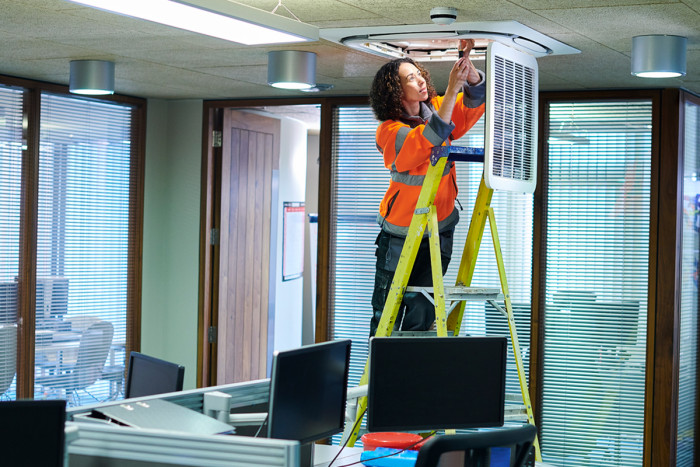Refrigeration/Air-conditioning Technician
Kaihangarau Pūrere Whakamātao
Alternative titles for this job
Refrigeration/air-conditioning technicians install, service and maintain refrigeration and air-conditioning systems.
Pay
Qualified refrigeration/air-conditioning technicians usually earn
$50K-$95K per year
Source: Kelly Services, 2019.
Job opportunities
Pay
Pay for refrigeration/air-conditioning technicians depends on skills, experience and where they work.
- Apprentice refrigeration/air-conditioning technicians may start on the training minimum wage or minimum wage, with pay increasing as they gain skills or complete unit standards.
- Qualified refrigeration/air-conditioning technicians usually earn between $50,000 and $95,000 a year.
- Highly experienced refrigeration/air-conditioning technicians who manage teams or own their own businesses may earn more.
Source: Kelly Services, '2019 Salary Guide', March 2019.
- PAYE.net.nz website - use this calculator to convert pay and salary information
- Employment New Zealand website - information about minimum wage rates
(This information is a guide only. Find out more about the sources of our pay information)
What you will do
Refrigeration/air-conditioning technicians may do some or all of the following:
- advise clients on different refrigeration/air-conditioning systems
- install refrigeration/air-conditioning systems
- test, adjust and balance systems to make sure they work properly
- check refrigeration/air-conditioning systems for faults and repair them
- manage and supervise less experienced refrigeration/air-conditioning technicians.
Skills and knowledge
Refrigeration/air-conditioning technicians need to have knowledge of:
- mechanical and electrical systems
- how gases behave at different pressures and temperatures
- basic physics and chemistry
- the advantages and disadvantages of different refrigeration/air-conditioning systems
- how to interpret building plans and technical drawings.
Working conditions
Refrigeration/air-conditioning technicians:
- may work more than 40 hours a week, including evenings and weekends
- may work shifts
- work indoors and outdoors on commercial and residential sites
- may work in confined spaces or at heights
- may travel to work on projects.
Entry requirements
There are no specific requirements to become a refrigeration/air-conditioning technician as you gain skills on the job. However, many employers prefer to hire refrigeration/air-conditioning technicians who have or are working towards a qualification.
To become a fully qualified refrigeration/air-conditioning technician you need to complete an apprenticeship and gain a New Zealand Certificate in Refrigeration and Air Conditioning – Trade (Level 4). Competenz oversees refrigeration/air-conditioning apprenticeships.
Most refrigeration/air-conditioning technicians also need a driver's license.
Secondary education
No specific secondary education is required for this job, but maths, physics, digital technologies, construction and mechanical technologies, processing technologies and English to at least NCEA Level 2 are useful.
For Year 11 to 13 learners, trades academies and the STAR and Gateway programmes are good ways to gain relevant experience and skills.
These programmes may help you gain an apprenticeship, but do not reduce the amount of time it takes to complete it.
Personal requirements
Refrigeration/air-conditioning technicians need to be:
- able to work accurately with their hands
- good problem solvers
- able to follow health and safety guidelines
- good at making calculations and problem solving
- comfortable working in enclosed spaces and at heights.
Useful experience
Useful experience for refrigeration/air-conditioning technicians includes:
- plumbing and gasfitting
- work in an engineering workshop
- electrical work.
Physical requirements
Refrigeration/air-conditioning technicians need to have a good level of fitness and be strong as they may need to carry heavy tools and equipment.
Registration
Qualified refrigeration/air-conditioning technicians need to be registered and licensed with the Electrical Workers Registration Board.
To work with compressed gas you must hold an approved filler compliance certificate.
- Electrical Workers Registration Board (EWRB) website - information on registration and licensing
- Worksafe New Zealand website - information on becoming an Approved Filler
Find out more about training
- Competenz
- 0800 526 1800 - info@competenz.org.nz - www.competenz.org.nz
- Institute of Refrigeration, Heating & Air Conditioning Engineers (IRHACE)
- (09) 273 0044 - www.irhace.org.nz
What are the chances of getting a job?
Refrigeration/air-conditioning technicians are in demand because not enough people are being trained to meet the demand for workers.
According to the Census, 1,485 refrigeration/air-conditioning technicians worked in New Zealand in 2018.
Refrigeration/air-conditioning technician on skill shortage list
Refrigeration/air-conditioning technician appears on Immigration New Zealand's construction and infrastructure skill shortage list. This means the Government is actively encouraging skilled refrigeration/air-conditioning technicians from overseas to work in New Zealand.
Types of employers varied
Most refrigeration/air-conditioning technicians are self-employed, or work for private companies specialising in the sale, design, installation and maintenance of refrigeration and air-conditioning systems.
Sources
- Education Counts, 'Vocational Education and Training Enrolments - Field of Study', accessed August 2020, (www.educationcounts.govt.nz).
- Immigration New Zealand, 'Construction and Infrastructure Skill Shortage List', 27 May 2019, (www.immigration.govt.nz).
- Ministry of Business, Innovation and Employment, ‘Engineering Technicians’, accessed September 2020, (www.occupationoutlook.mbie.govt.nz).
- Stats NZ, '2018 Census Data', 2019.
(This information is a guide only. Find out more about the sources of our job opportunities information)
Progression and specialisations
Refrigeration/air-conditioning technicians may progress to set up their own refrigeration or air-conditioning business.
They may specialise in either refrigeration or air-conditioning systems.
Last updated 9 December 2024


